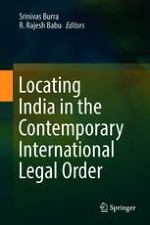2018 | OriginalPaper | Buchkapitel
Making International Tax Law: Analysing Tax Jurisprudence in India
verfasst von : Ajay Kumar
Erschienen in: Locating India in the Contemporary International Legal Order
Verlag: Springer India
Aktivieren Sie unsere intelligente Suche, um passende Fachinhalte oder Patente zu finden.
Wählen Sie Textabschnitte aus um mit Künstlicher Intelligenz passenden Patente zu finden. powered by
Markieren Sie Textabschnitte, um KI-gestützt weitere passende Inhalte zu finden. powered by
